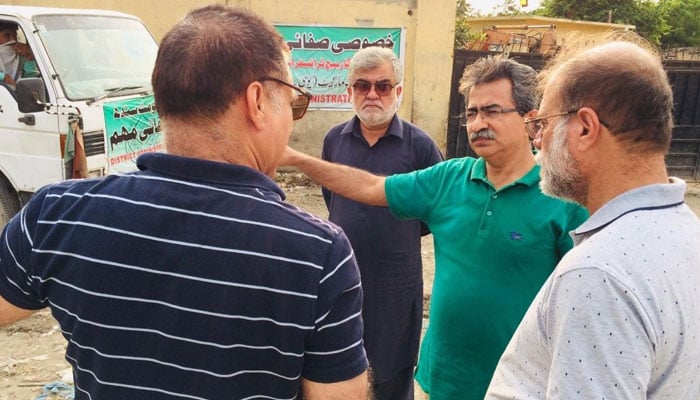‘SSWMB performance below par in Karachi due to limited control’
In a span of five years, the Sindh Solid Waste Management Board (SSWMB) could not expand its operations to all the 29 districts of the province, the board’s managing director said on Wednesday.
Addressing a session titled ‘Analysis of Karachi’s Current Garbage Situation’ at the Urban Resource Centre, Asif Ikram said that even in the metropolis, where the SSWMB is functional, its performance does not seem to be praiseworthy because it has control over only 35 per cent of the city.
Ikram said the district municipal corporations (DMCs) comprise 35 per cent of Karachi, while the District Council, which deals with 15 per cent of the city, controls the rural areas. He said the Pakistan Railways covers two per cent of the metropolis, while there are also the Karachi Port Trust, the Civil Aviation Authority, the Port Qasim Authority and several other landowning agencies.
“Karachi, as far as jurisdiction is concerned, is divided into several municipalities,” said the MD, adding that the SSWMB covers only 35 per cent of it.
Explaining how complex the situation is, he said that in the South DMC, they have jurisdiction over one road, while the adjacent road is under the control of military cantonment and another is covered by the Pakistan Railways. “I can clean my road, not theirs.”
The only way to deal with this issue, according to him, is better coordination. Regarding the board’s failure to expand its operations, he explained that every project has a pilot phase. “Karachi is the pilot phase,” he said, adding that they will gradually expand their operations.
Ikram said the SSWMB is an act of parliament and came into being in 2014, but it started functioning properly after suitable appointments in 2016. Before the board, the Karachi Metropolitan Corporation and the DMCs managed solid waste in the city, he added.
He said the metropolis generates around 12,000 to 14,000 tonnes of garbage a day, while some estimates put the range at 14,000 to 18,000 tonnes. These estimates, according to him, are calculated by including the city’s suburbs and its increasing population.
The MD said garbage management starts with its collection from door to door, adding that in foreign countries the people have green and yellow bins to discard plastic waste in one and the remaining trash in the other.
He said that compactor trucks then reduce the trash collected, following which it is processed at garbage transfer stations (GTSs), from where it is taken to landfill sites. In Karachi, however, Afghan children collect garbage from houses and dump it at the nearest Kachra Kundi (dumping site), he added.
But before dumping the garbage, he continued, the children forage in it for glass, steel, plastic and paper. He pointed out two problems that emerge because of the scavenging: the SSWMB loses valuable items and the trash gets strewn across roads.
“We can recycle the garbage and make energy from it,” he said, adding that this can be possible if it is not scavenged. Ikram said the board picks up garbage from the GTSs and disposes it of to the two landfill sites of the city.
He stressed the need for human and machine resources for garbage management. He said the areas of the city where there are proper main roads, loaders lift the garbage, but where there are narrow streets, they use tricycles.
He also addressed the cultural aspect of garbage, saying that in houses garbage is thrown in the open and not in dustbins. Moreover, he added, rubble can be seen in huge quantities, especially in District South.
He said that while cleaning storm water drains, they excavated huge amounts of debris. “Drains, be they for sewage or rain, are not for throwing rubble.” He also said they have a backlog of 1.6 million tonnes of garbage in the city that has accumulated over the years. This, cannot be lifted overnight because it needs proper policy, he added. Ikram said that last month 257,000 tonnes of garbage was disposed of to landfill sites. He admitted that the SSWMB was unable to lift all the garbage that was produced in the city.
Publish In The News By Oonib Azam 03 October 2019
